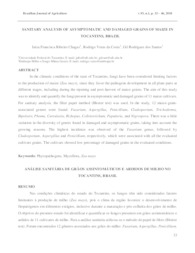Sanitary analysis of asymptomatic and damaged grains of maize in Tocantins, Brazil.
Sanitary analysis of asymptomatic and damaged grains of maize in Tocantins, Brazil.
Author(s): CHAGAS, J. F. R.; COSTA, R. V. da; SANTOS, G. R. dos
Summary: In the climatic conditions of the state of Tocantins, fungi have been considered limiting factors to the production of maize (Zea mays), since they favor the pathogens development in all plant parts at different stages, including during the ripening and post-harvest of maize grains. The aim of this study was to identify and quantify the fungi present in asymptomatic and damaged grains of 11 maize cultivars. For sanitary analysis, the filter paper method (Blotter test) was used. In the study, 12 maize-grain-associated genres were found: Fusarium, Aspergillus, Penicillium, Cladosporium, Trichoderma, Bipolaris, Phoma, Curvularia, Rizhopus, Colletotrichum, Papularia, and Nigrospora. There was a little variation in the diversity of genres found in damaged and asymptomatic grains, taking into account the growing seasons. The highest incidence was observed of the Fusarium genus, followed by Cladosporium, Aspergillus and Penicillium, respectively, which were associated with all the evaluated cultivars grains. The cultivars showed low percentage of damaged grains in the evaluated conditions.
Publication year: 2018
Types of publication: Journal article
Unit: Embrapa Maize & Sorghum
Keywords: Fitopatógeno, Grão ardido, Micoflora
Observation
Some of Embrapa's publications are published as ePub files. To read them, use or download one of the following free software options to your computer or mobile device. Android: Google Play Books; IOS: iBooks; Windows and Linux: Calibre.
Access other publications
Access the Agricultural Research Database (BDPA) to consult Embrapa's full library collection and records.
Visit Embrapa Bookstore to purchase books and other publications sold by Embrapa.

